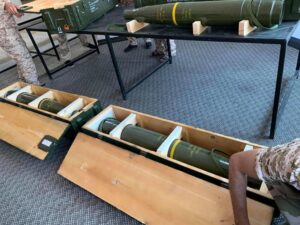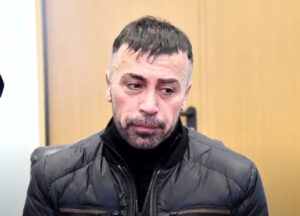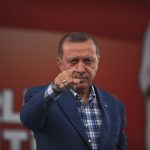Nuri Gökhan Bozkır, a former Turkish intelligence asset who was identified last year by Nordic Monitor as having smuggled arms to jihadists, blew the whistle on the Turkish government’s clandestine operations in foreign countries when he faced the risk of extradition from Ukraine to his home country.
Speaking to Ukraine’s Strana media outlet, Bozkır revealed how he was involved in moving arms and military supplies to armed groups in many countries as part of a secret operation conducted by Turkish intelligence agency MIT. Some of the arms were financed by cash provided by Qatar, he said, sharing photos and videos from his personal archive of the transportation of arms and cash.
Bozkır, a major in special operations, had been dishonorably discharged for his involvement with mafia gangs that were embedded in the Turkish security forces. Bozkır worked for Combat Search and Rescue (MAK), an elite force attached to the Special Forces Command (ÖKK) in the Turkish military.
He was convicted in a military court and sentenced to six years in a 2007 case known the “Sauna Gang,” which involved bureaucrats and politicians who were being blackmailed. He was also tried in military court for stealing classified documents from a military base. He had also been tried in civilian criminal court but was acquitted on Nov. 14, 2016 after the government of President Recep Tayyip Erdoğan intervened in the case and rewarded Bozkır for doing the dirty bidding of the intelligence agency.
Since 2007 he has been involved in moving arms to hot spots in many countries including Georgia, Iran, Afghanistan, Bosnia and Herzegovina, Azerbaijan and Syria.

When shipments of illegal arms he was involved with were busted in 2015 and early 2016, MIT arranged him safe passage to Ukraine, where he was supposed to lie low. However a conflict of interest had emerged between him and MIT while he was there and still involved in arms trafficking. Turkey had to resort to an extradition request to forcibly remove him from Ukraine, citing past charges against him, but never delivered the case file needed to justify his return.
Now living in Ukraine with his wife, Bozkır is fighting the extradition request filed by the Turkish government, fearing that he will be killed if Ukrainian authorities hand him over. He decided to spill the beans on the Turkish government and its notorious intelligence agency by talking to the media. Although he tried to spin some details to create a favorable perception of himself, his statements and the evidence he shared nevertheless shed further light on how the Erdoğan government has been empowering jihadists around the world.
He was enlisted by MIT as an asset long before he started doing business in Syria, where he claimed he was introduced to MIT by his Syrian partner Khalil Kharmid in 2012. The arms were procured by MIT, with Bozkır functioning as a buyer who scouted arms suppliers from Central Asia to Eastern Europe. The money was provided by Qatar and delivered to Turkey in containers on Qatari planes.
“If I had not seen it with my own eyes, I would never have believed that this was possible. Seven containers full of US dollars arrived from Qatar. They were unloaded in front of me in secrecy — it was all controlled by MIT,” he told Strana, adding that he got as much money as he needed to start bidding for the next batch of arms deliveries. He had continued to purchase and deliver weapons to Syria between 2012 and 2015. The purchases were procured by the Turkish army on paper when in fact they were destined for jihadist groups.
A single shipment cost around $2-$4 million depending on the type of arms contracted, and Bozkır transported suitcases full of cash abroad under the control of MIT in order to pay the contractors. The arms were hidden under food and grocery items as was exposed in a 2015 arms trafficking case where high-grade explosive detonation cords destined for jihadists were found stashed under sacks of onions in the back of a truck.
Nine suitcases full of cash were transported by Bozkır to pay arms suppliers:
The former military man also revealed that the price of the arms was inflated in order to take some cuts from the cash delivered by Qatar. “During the purchase and transportation of the weapons, the cost of each batch increased by an average of $2 to $3 million,” he said. The money gained from the bloated figures was taken by MIT.
Considering that Turkish intelligence chief Hakan Fidan admitted in a leaked audio in March 2014 that Turkey had sent 2,000 trucks loaded with arms to groups in Syria, MIT possibly generated around $4 billion in revenue from the cut it obtained by inflating the figures. This is a huge amount of money that many believe President Erdoğan and his family have personally benefited from, thanks to the lucrative arms smuggling to jihadists.
No wonder Erdoğan personally raised the extradition of Bozkır during a visit to Ukraine, where he met with Ukrainian President Volodymyr Zelensky. He even threatened Ukraine with repercussions in bilateral relations if Bozkır was not handed over. Speaking to reporters on his return flight on February 4, 2020, Erdoğan said: “I specifically asked him [the Ukrainian president] to do this [extradite Bozkır]. I said: ‘It’s very, very important to us. He is attempting to get asylum right now. Therefore, if you make a mistake here and open the door to that, it could mean trouble for our relations.’”
Bozkır believes he will be killed if he returns to Turkey because he knows too much about the dirty relations of Turkish intelligence and President Erdoğan.

According to Bozkır, Recep Sancak, a Turkish businessman close to President Erdoğan, approached him in 2018 to procure weapons from Ukraine for destinations in countries under UN sanctions, promising to sort out Bozkır’s legal troubles at home in exchange. But the deal never came to fruition. Sancak’s uncle, Ethem Sancak, has long been working with President Erdoğan in obtaining lucrative government contracts and tenders. His firms produce defense and military materiel for the Turkish army as well as exporting to clients in other countries.
Ukrainian authorities detained him on July 10, 2019 on a filing through Interpol by the Turkish government that claimed he was involved in the cold case of Necip Hablemitoğlu, who was gunned down in 2002. He was released into house arrest after three months in jail, and eventually that was lifted as well with a flight ban imposed after the Turkish government failed to send legal documents justifying his temporary detention and eventual extradition. His asylum application is still pending.
On November 30, 2020 Erdoğan received Ukraine’s Prime Minister Denys Shmyha in Ankara, and the extradition was reportedly raised again during the meeting.
Bozkır provided this video that shows fighters receiving arms in Syria in 2015:
By: Abdullah Bozkurt
Source: Nordic Monitor



